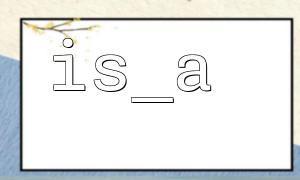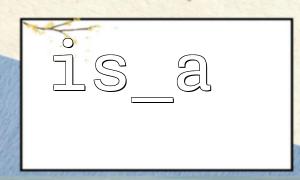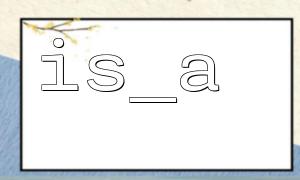PHP's reflection mechanism allows developers to check the structural information of classes, interfaces, functions, methods and extensions at runtime. To give the simplest example, we can use ReflectionMethod to obtain parameter information of a certain class method:
<code> $method = new ReflectionMethod(MyClass::class, 'myMethod'); $params = $method->getParameters(); </code>This allows us to know the number of parameters, name, type prompts, etc. of the method, but it will not automatically perform type verification.
is_a() is a function that determines whether an object is a certain class or its subclass at runtime. The syntax is as follows:
<code> is_a($object, $className, $allow_string = false) </code>Its advantage is its strong dynamicity and is especially suitable for use with the reflection mechanism for type checking.
Suppose we are building a dependency injection container that is responsible for automatically injecting parameters according to the method signature. For security reasons, we want to ensure that the injected object complies with the type constraints defined by the method.
Here is an example of using reflection + is_a to implement strict type checking:
<code> function invokeWithDependencies($className, $methodName, array $dependencies) { $refMethod = new ReflectionMethod($className, $methodName); $params = $refMethod->getParameters(); $resolvedParams = [];
foreach ($params as $param) {
$paramType = $param->getType();
if ($paramType && !$paramType->isBuiltin()) {
$expectedClass = $paramType->getName();
$matched = false;
foreach ($dependencies as $dep) {
if (is_object($dep) && is_a($dep, $expectedClass)) {
$resolvedParams[] = $dep;
$matched = true;
break;
}
}
if (!$matched) {
throw new InvalidArgumentException("No matching dependency for parameter \${$param->getName()} of type $expectedClass");
}
} else {
// Non-object type,Skip or use default values
$resolvedParams[] = $param->isDefaultValueAvailable() ? $param->getDefaultValue() : null;
}
}
return $refMethod->invokeArgs(new $className(), $resolvedParams);
}
</code>
In this example, we compare the object in the $dependencies array to reflect the method parameter types obtained by reflection, and use is_a() to ensure that the object is indeed the type required by the parameter or its subclass. If no matching dependencies are found, an exception is thrown to avoid calls with mismatch in type.
Combined with dependency injection container : When registering an instance in the service container, the class name is saved, and automatically injected through reflection and is_a() when calling.
Processing interfaces and abstract classes : is_a() is also applicable to interfaces and abstract classes, and can be used for automatic injection interface implementation.
Use $allow_string = true with caution : Although it is flexible to enable string class names, it is easy to break type safety unless you have very strict control over the caller.













